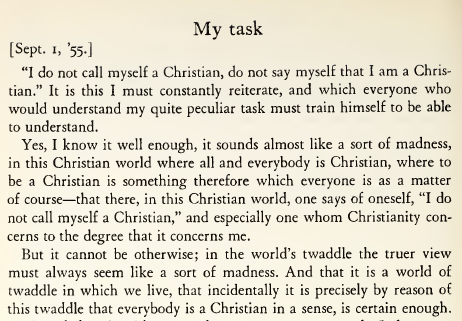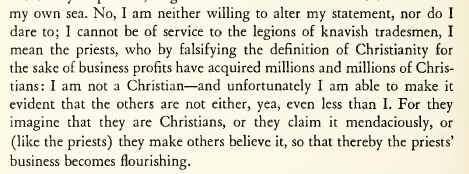As someone who is not familiar with Edwards (apart from familiarity with “Sinners in the hands of an angry God”, and who already on those ‘quite other’ grounds was not inclined to seek out his work, I’m curious how you or anybody else here more knowledgeable than I of him would describe his influence on our faith traditions today. That he was an influencer is easy to imagine. I’m just curious about the nature of the influence - for better or worse.
So, what apart from slavery and damnation by God the psycho did he get right?
While it doesn’t go by this name, it is what we show ourselves to be when we treat other people like they don’t exist.
This for instance, is one of my all time favorite books:
A Faithful Narrative of the Surprising Work of God in the Conversion of Many Hundred Souls in Northampton
Also, Gerstner and Sproul give him credit for the ontological argument they use.
@Klax @Mervin_Bitikofer
For a long time the only thing I knew about Edwards was Sinners in the Hands of an Angry God, which I wasn’t a huge fan of.
Later on, I leaned about how the enlightenment shaped his worldview and how much he admired and incorporated ideas from biology and Newton’s theory of optics (See “On Insects” and “Of the Rainbow”). His desire to give a “Rational Account” of the doctrines of Christianity in terms of contemporary philosophy, influenced by natural philosophers like Newton and Locke.
He is credited with starting the first Great Awakening and being one of the biggest influences on Protestant missionary work in the 19th century. I don’t think it is much of a stretch to say he influenced many theologians to take philosophy and science seriously.
Over time, Edwards started to be remembered as only a hellfire preacher. Only recently has much of his work been restudied, with emphasis on his ideas that the heart of religion was love, and his conceptions on harmonizing beauty, harmony, and ethics. For instance, in Affections, Edwards insisted, against the revival critics’ ideal of sober, “reasonable” religion, that “the essence of all true religion lies in holy love,” a love that proves its genuineness by its inner quality and practical results. He seemed to argue for a balance between passion and rationality in the first Great Awakening, arguing against both the reduction of Christianity to just moral codes as well as against some of the disruptions caused by the first great awakening.
Edwards’ thoughts on the Trinity are hard to ignore.
Interestingly, the producer of Emancipation got himself into a bit of hot water for buying the original image of “Whipped Peter” and bringing it to the premier to show it off like a collectible.
The only thing I would add to @Paulm12’s post #25 is that Edwards’ work on the Trinity can’t be ignored by academic theologians, and he succeeded his son-in-law Aaron Burr Sr. as the third president of Princeton Univ. (Yes, the father of that Aaron Burr.)
True to a point. If someone has an obvious blind spot, that should be taken into account when reading anything in their work that touches upon that point. I wish more philosophers and theologians were like Kierkegaard. He said upfront that he was describing a Christian ideal that he doesn’t live up to himself:


This sort of illustrates the problem. Do we take seriously his thoughts on love when he wasn’t able to recognize and love the imago Dei in those he enslaved? Do we take seriously his ethical thoughts when he justified chattel slavery?
The TGC article on reading Edwards was surprisingly good. Thanks for the link.
Should we take seriously the discussions and human rights discourses of our own constitution and founding declarations, since many of its authors could only recognize 3/5 of the humanity in some of their fellow men? Always a serious strike against them - even adjusting for excuses of surrounding culture and all that - I agree with you (and Lord have mercy on us for things we blithely accept or [maybe] raise feeble complaint over now, for which our descendents some century hence will contemptuously ■■■■ us for our present moral stupidity.)
True. This country has never lived up to its founding ideals. It’s not a Christian nation. I appreciated the fact that the TGC article quoted James Baldwin and Wendell Berry. As Baldwin said,
History, as nearly no one seems to know, is not merely something to be read. And it does not refer merely, or even principally, to the past. On the contrary, the great force of history comes from the fact that we carry it within us, are unconsciously controlled by it in many ways, and history is literally present in all that we do.
Interesting info to get about Kierkegaard, thsnks. @Kendel will be interested if not already familiar with the source. Would have been interesting to have you on board when we read Penner, something she organized and made very interesting.
Sorry I haven’t been a regular in a while.
And other stuff
And yet more (although not slavery)
And finally:
Nice < / sarcasm >
Hey you’re not a bored retired guy yet. Your day will come.
Yep. Caught my eye, Mark. Thanks for point it out to me. I’ll be checking for citations in a minute.
K’s criticisms are painful to read, because they are true. He forces the serious reader to seriously reevaluate constantly. It’s the work of a lifetime.
Page 282 here:
@Jay313 keeps throwing out SK tidbits here and there. So far all worth keeping copies of. Jay, you would have been a valuable addition to the discussion, but we can’t do it all! You can see how some of us spent our summer vacation here:
Edwards was just trying to circle, envelope and square the ragged, razor edged polygon of accumulated biblicism and lacerating, toxic impact in the gut of society with love. Good luck with that.
The Great Awakening of the 18th century included Wesley, Whitfield, and Jonathon Edwards.
My question would be - Were they perfect people?
My answer would be - No, they were like you and me - not perfect.
Did God use them? - Yes
Does God use imperfect even evil people? - Yes.
God raises up ruthless Babylon (Habakkuk 1:5-11) to achieve his purpose. Does God use evil people to accomplish his purpose?
There is a distinction between God controlling evil and God creating evil. God is not the author of sin but can use sinful people to attain an objective. Romans 8:28 says, “For those who love God, all things work together for good, for those who are called according to his purpose.”
“All things” includes both good and bad things. God can use struggles, heartbreaks and tragedies in ways to bring about His glory and our good.
Even though we don’t understand the reason for such events, they are part of His perfect, divine plan. If God could not control evil, He would not be God.
His sovereignty demands that He control everything, even “dreaded” nations such as Babylon.
Perfection isn’t the standard. Again, it’s a trivial observation to say that no one’s perfect. The question still remains: At what point does a Christian theologian/leader cross a line so egregious that we shouldn’t take them seriously anymore?
Certain historical figures should continue to be read with appropriate caution, but more modern theologians are one voice in a chorus. It’s not too hard to reject their theologizing as resting on a faulty foundation and find better.
So I don’t know who that guy is specifically but if the question is in general, can I separate someone’s academic or theological contributions from their lifestyle… I can. Same as I separate art from the artist. I think HP Lovecraft was a racist prick. He’s still my favorite author.
Or let’s say that there was an organization called ThanoParafrosyni and they focused on science and faith. It was founded by William Ruddick and this guy did a lot of amazing stuff, especially in presenting concepts about religion and science. Wrote some amazing books and so on. Then later on did something terrible, I could still appreciate the wisdom without respecting the person.
You have your answer, no here? “Cross the line so egregious.”
I wonder what would be the criteria to decide “Hey that is so egregious?”
John 7:24 requires that we judge justly…taking everything into account of course.
However, we are all gospel redeemable and there is a river of grace, and will stand before God the only true and just.
I have to side with you here against my friend Jay. Of course no one is perfect but they can have insights that are even in the midst of an immoral life (Edwards) or before falling apart and losing connection to the initial vision later (Heidegger). Insight is a gift whose necessary qualifications are not well known. I do think you can see things clearly and even in original ways at one time and then fall out of whatever grace you enjoyed during the original reception. I suspect that is something like what befell Heidegger but of course this is only speculation which my imagination finds plausible.
Like dealing with copyright issues, it’s hard to establish firm, clearly-defined “rules” for how to handle any author’s writing. However, I’m not inclined to invoke the need for forgiveness, either. Christians are called to be wise as serpents. Forgiveness and “not judging lest…” are too often invoked for license or ignorance.
We need to examine each text for what it is, what it demonstrates, and we need to evaluate accordingly. We cannot always know much about the author. And we can’t be so naive to think there was ever a “golden age” from which all writings are perfectly trusth-worthy. To complicate matters, morals change. Among slave-holders at his time Edwards was a moral and enlightened guy. It’s horrible to say. Today, it’s immoral to say. There simply is no such thing today as an enlightened, moral slave-holder. Another example, Luther’s anti-semitism is undeniable and inexcusable. We need to approach any author, really, with some suspicion, often a lot.
All that being said, my view is read everything you are inclined to read, but read critically. In the video I posted of the eugenics materials from work, I dig this kind of stuff out of our collection as evidence of evil dressed up in silks. If we remind ourselves of it, we are wiser readers, better able to identify “acceptable evils” that may be hidden in plain sight. The same goes for any kind of writing. We need people to read the heros’ work with the same critical eye, understanding the times then as well as now. It’s possible we find gold here and there. It’s also possible that the texts have outlived their usefulness.